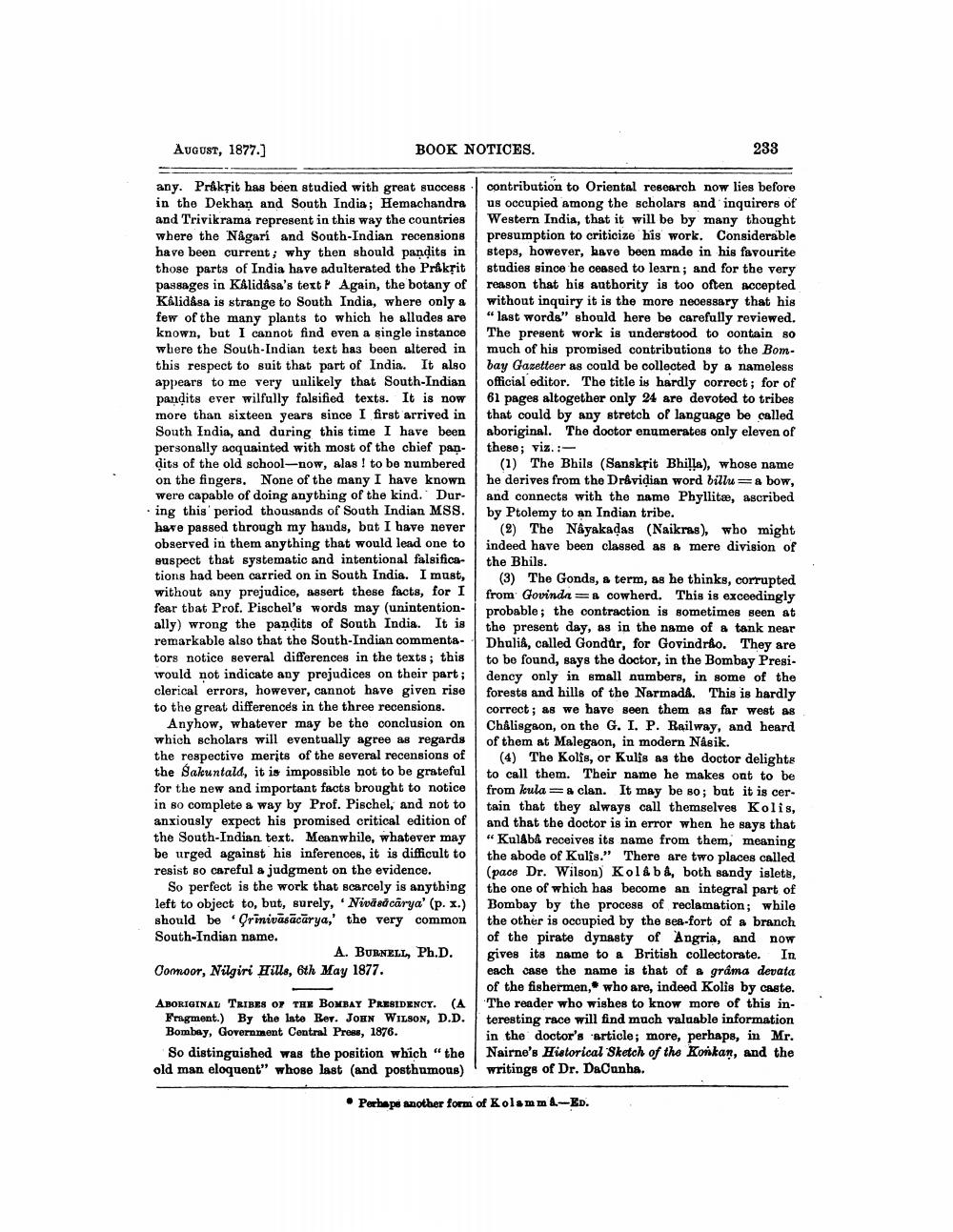________________
August, 1877.]
BOOK NOTICES.
233
any. Praksit has been studied with great success contribution to Oriental research now lies before in the Dekhan and South India; Hemachandra us occupied among the scholars and inquirers of and Trivikrama represent in this way the countries Western India, that it will be by many thought where the Någari and South Indian recensions presumption to criticize his work. Considerable have been current; why then should pandits in steps, however, have been made in his favourite those parts of India have adulterated the Prikrit studies since he ceased to learn; and for the very passages in Kalidasa's text P Again, the botany of reason that his authority is too often accepted Kalidasa is strange to South India, where only a without inquiry it is the more necessary that his few of the many plants to which he alludes are "last words" should here be carefully reviewed. known, but I cannot find even a single instance The present work is understood to contain so where the South Indian text has been altered in much of his promised contributions to the Bomthis respect to suit that part of India. It also bay Gazetteer as could be collected by a nameless appears to me very unlikely that South-Indian official editor. The title is hardly correct; for of pandits ever wilfully falsified texts. It is now 61 pages altogether only 24 are devoted to tribes more than sixteen years since I first arrived in that could by any stretch of language be called South India, and during this time I have been aboriginal. The doctor enumerates only eleven of personally acquainted with most of the chief pan- these; viz.:dits of the old school-now, alas ! to be numbered (1) The Bhils (Sanskrit Bhilla), whose name on the fingers. None of the many I have known | he derives from the Dravidian word billu=a bow, were capable of doing anything of the kind. Dur- and connects with the name Phyllitæ, ascribed . ing this period thousands of South Indian MSS. by Ptolemy to an Indian tribe. have passed through my hands, but I have never (2) The Nayakadas (Naikras), who might observed in them anything that would lead one to indeed have been classed as a mere division of euspect that systematic and intentional falsifica- the Bhils. tions had been carried on in South India. I must, (3) The Gonde at
(3) The Gonds, a term, as he thinks, corrupted without any prejudice, assert these facts, for I from Govinda = cowherd. This is exceedingly fear tbat Prof. Pischel's words may (unintention- probable; the contraction is sometimes seen at ally) wrong the pandits of South India. It is
the present day, as in the name of a tank near remarkable also that the South Indian commenta- Dhulia, called Gondar, for Govindrio. They are tors notice several differences in the texts; this to be found, says the doctor, in the Bombay Presi. would not indicate any prejudices on their part; dency only in small numbers, in some of the clerical errors, however, cannot have given rise forests and hills of the Narmads. This is hardly to the great differences in the three recensions. correct; as we have seen them as far west as
Anyhow, whatever may be the conclusion on Chalisgaon, on the G. I. P. Railway. and heard which scholars will eventually agree as regards of them at Malegaon, in modern Nasik. the respective merits of the several recensions of (4) The Kolis, or Kulis as the doctor delights the Sakuntald, it is impossible not to be grateful to call them. Their name he makes out to be for the new and important facts brought to notice from loula =a clan. It may be so; but it is cerin so complete a way by Prof. Pischel, and not to tain that they always call themselves Kolis, anxiously expect his promised critical edition of and that the doctor is in error when he says that the South Indian text. Meanwhile, whatever may "KulAbA receives its name from them, meaning be urged against his inferences, it is difficult to the abode of Kulis."
the abode of Knita." There are t
There are two places called resist so careful a judgment on the evidence. (pace Dr. Wilson) Kol&b, both sandy islete,
So perfect is the work that scarcely is anything the one of which has become an integral part of left to object to, but, surely, Nivāsācārya' (p. x.) Bombay by the process of reclamation; while should be Srinivasācārya,' the very common the other is occupied by the sea-fort of a branch South-Indian name.
of the pirate dynasty of Angria, and now
A. BURNELL, Ph.D. gives its name to a British collectorate. In Comoor, Nilgiri Hills, 6th May 1877.
each case the name is that of a grâma devata
of the fishermen, who are, indeed Kolis by caste. ABORIGINAL TRIBES OF THE BOMBAY PRESIDENCY. (A The reader who wishes to know more of this inFragment.) By the late Rev. JOHN WILSON, D.D. teresting race will find much valuable information Bombay, Government Central Press, 1876.
in the doctor's 'article; more, perhaps, in Mr. So distinguished was the position which "the Nairne's Historical Sketch of the Konkan, and the old man eloquent" whose last (and posthumous) writings of Dr. DaCunha.
• Perhaps another form of Kolamm
-ED.




